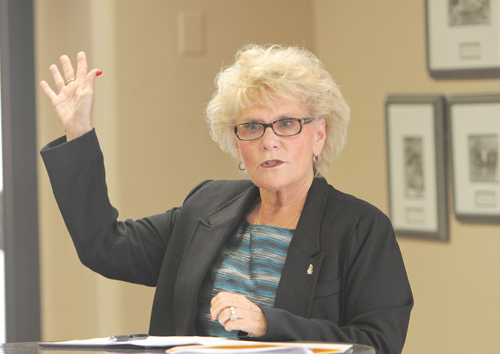Proposed fee focal point of open session at YSU

Youngstown State University President Cynthia Anderson talks to students and faculty Monday afternoon at Kilcawley Center in a special question-and-answer session.
By Karl Henkel
YOUNGSTOWN
A proposed transportation fee was the focal point of a question-and-answer session among Youngstown State University President Cynthia Anderson, students and faculty.
About 30 university members attended the open Monday afternoon session, which focused heavily on a proposed, mandatory $100-per-semester fee that would increase the parking-pass revenues from $1.9 million to $2.8 million to help pay for parking- facility upkeep.
Only students who buy parking passes are paying the $100 now. The proposal would require all students taking more than six credit hours to pay $100 per semester — regardless of their parking intentions.
The university board of trustees, likely to discuss the proposal at a future meeting, would have to approve the fee.
Anderson said the reason for the traffic fee is to help direct students to park in university-sponsored lots, which she said are better protected by campus police.
“We cannot keep you safe if you’re parking across Belmont Avenue,” Anderson told a group of students.
YSU spokesman Ron Cole said it is unknown how much extra revenue a mandatory fee could generate, but that money would go toward improving current parking functions and to set up a fund for the replacement of the Lincoln Avenue parking deck.
Cole said the parking deck likely will need to be replaced within the next 12 to 15 years.
Anderson estimated the cost of a new parking deck to be about $25 million.
Some students questioned whether a mandatory transportation fee was fair, especially as tuition rates continue to rise.
“It’s a lot of money,” said Danny Fernback, a sophomore who stopped paying the $100-per-semester parking fee at the beginning of the current term.
Some students also questioned whether there are enough parking spaces available to accommodate all students.
YSU currently has 6,755 parking spaces.
Gene Grilli, vice president for finance and administration, said university class schedules would allow all students to park, just not all at the same time.
Fernbeck said he envisions troubles with the proposed scenario.
“If everyone has a parking pass, everyone is going to feel entitled to have a spot,” he said. “But I understand why they are trying to make up for it.”
Some nontraditional students also voiced sentiments toward adding a technology-based introductory course to better prepare them for computer-based classes.
Sharon Zeicu, 61, who had little computer training before attending YSU last fall, said she had to drop her entire first-semester workload because she could not keep up with the technological aspects of classes.
“I literally had no computer skills,” Zeicu said, adding that a noncredit course would be a sufficient addition in her opinion. “I was freaked out.”
 43
43
